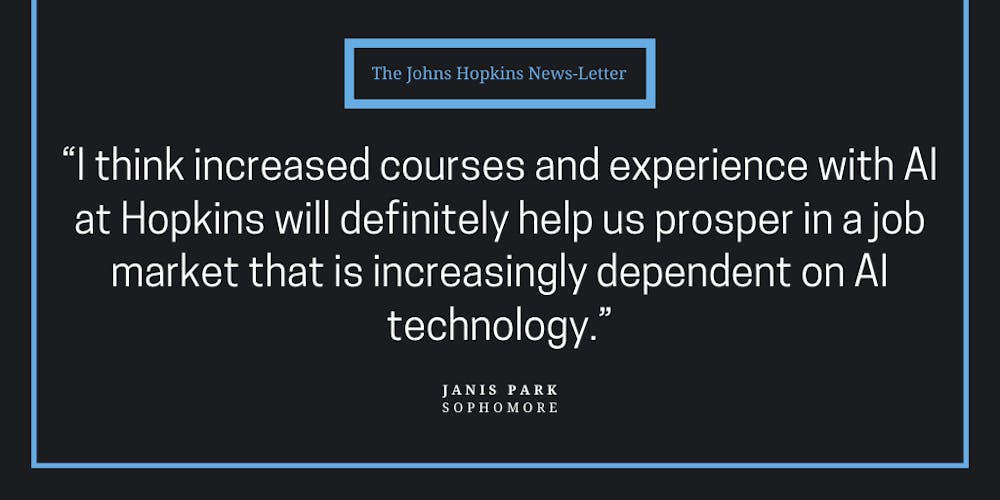PILOT, the academic support program offered to students to work on problem sets in groups, will be introducing artificial intelligence (AI) technology to a number of sessions in mid-October. This development follows a number of announcements on Hopkins’s goal to find a place for AI in education.
The PILOT program will offer ChatGPT as an additional resource to the students over a period of three weeks. This initiative will be an experimental one that could help the University gauge AI tools’ utility in aiding education.
In an email to The News-Letter, Director of Academic Support Ariane Kelly elaborated on how the AI tools will be implemented in PILOT sessions.
“The study participants will take a 30-minute quiz that is aligned with the content and weekly progress of the syllabus,” she wrote. “Students will be randomly assigned into a control arm (no use of ChatGPT), a one-round use of ChatGPT arm (with a prompt instruction) and a multi-round use of ChatGPT arm (with the same prompt instruction).”
The data collected in PILOT sessions will be provided to the Center for Teaching Excellence and Innovation (CTEI) to support its research project that investigates the impacts of AI tools on college students’ academic learning.
Kerry Wang, a freshman who attends PILOT for Discrete Math, expressed her excitement for the incorporation of AI in an interview with The News-Letter.
“AI could help create an after-class analysis to both help answer questions and generate topics to cover during the next meeting,” she said.
In an interview with The News-Letter, sophomore Janis Park, who attends PILOT for Calculus III, offered a different perspective on AI’s involvement in student learning. She believes that although many students may find AI tools helpful, they could also easily distract students from the process of challenging the mind. Additionally, in the case of PILOT, AI may prevent students from collaborating with others to solve problems.
“It could prevent us from showing our full capacity,” she said. “I think the inclusion of ChatGPT in PILOT could ruin the program’s main purpose.”
For many students, the introduction of AI to PILOT will likely be their first exposure to such technology in an instructional environment. This development is linked to many of the University’s investments in AI initiatives in recent years. One notable project is the JHU + Amazon Initiative for Interactive Artificial Intelligence (AI2AI) which took off in April 2022.
Sanjeev Khudanpur, founding director of AI2AI and a professor in the Department of Electrical and Computer Engineering, shared the project’s intentions in an email to The News-Letter. The collaborative initiative between Amazon scientists and Hopkins engineering faculty aims to make advancements in interactive AI technology, with Amazon’s funding sponsoring doctoral fellowships, factulty grants and internal projects.
Khudanpur also explained the current stage of the program and its potential to affect Hopkins affiliates.
“AI2AI is wrapping up its first year, in which we funded six Amazon Fellows and eight Faculty Awards and held three community-engagement events,” he wrote. “The second year of the Initiative is about to be kicked off with an event on Oct. 3, 2023... We hope to continue these activities for at least five years — and hopefully longer.”
For Hopkins affiliates not currently associated with the initiative, Khudanpur believes that AI2AI can serve as a model for future collaborations with shared goals of advancing technology. He emphasized that AI may have a potentially transformative role in academia itself in terms of knowledge discovery and youth education.
Apart from AI2AI, the University recently announced the creation of a new AI institute. The institute will reside on Homewood Campus and include 110 new faculty to support the institute’s pursuits of creating a greater impact on society.
Assistant Vice President for Media and Relations and News J.B. Bird explained the prospective role of the AI Institute in an email to The News-Letter.
“The goal is to create the leading academic hub for data science and artificial intelligence so as to drive research and teaching in every corner of the university and magnify our impact in every corner of the world,” he wrote.
The engagement with artificial intelligence at the institutional level will consequently affect students.
“In addition to new courses and research opportunities in the Whiting School [of Engineering], students will see more data science and AI content in courses across Hopkins, including in the social sciences and the humanities,” Bird wrote. “Students should begin to see new faculty, courses and internship opportunities as soon as fall 2024.”
The integration of AI in the University draws discussion across campus. Many students are aware of the potential AI has on society and themselves as Hopkins affiliates.
Wang expressed her support for the University’s recent investment in AI research and anticipated the opportunities it could create.
“With the addition of the data science and translation institute, many students, including myself, would have more ways to explore and obtain course and research opportunities and become the best versions of ourselves when we walk out of this campus,” she said.
Though she’s not planning to work directly in AI and data science, Park believes that the University’s investments align with the global surge of AI development and have the potential to support her later on.
“I think increased courses and experience with AI at Hopkins will definitely help us prosper in a job market that is increasingly dependent on AI technology,” she said.
Aimee Cho contributed reporting to this article.





